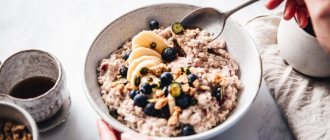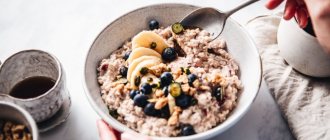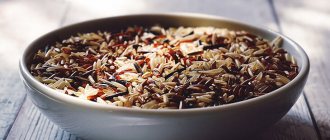Recently, topics such as low-carbohydrate diets, calculating fatty acids and balanced nutrition have become especially popular. According to many people, you need to minimize the consumption of foods that are rich in carbohydrates. However, this statement cannot be called completely correct, because these organic substances are represented by several types, which, in turn, have different properties. Carbohydrates are an integral part of any diet and are present every day in the diet of people, including those who play sports and adhere to a healthy lifestyle. To figure out whether fast carbohydrates are useful, products with which organic substances can be consumed during weight loss or as part of a balanced diet, it is worth learning about the types and properties of these organic substances.
Types of carbohydrates
Simple
. This category includes connections:
- lactose (found only in dairy products),
- glucose,
- sucrose,
- fructose.
Organic substances quickly enter the human blood, which causes a sharp increase in glucose in the body. Our defense mechanisms try to correct the situation, so the compounds are often transformed into fat reserves, and the feeling of hunger soon reappears. If we talk about products that contain simple (fast) carbohydrates, then these are mainly honey, various fruits and berries, as well as sugar, regardless of the type. For example, refined sugar consists almost entirely of sucrose, which is the sweetest carbohydrate.
Complex
. Unlike the previous category, these organic substances, on the contrary, are slowly processed and absorbed by the body, due to which they feed the muscles with energy for a long time. Complex carbohydrates include:
- dietary fiber,
- starch,
- glycogen.
Among the products, these are primarily whole grain cereals, durum wheat pasta, various legumes (including beans) and green vegetables.
Carbohydrates[edit | edit code]
Yuzhakov Anton Carbohydrates
Yuzhakov Anton The best sources of slow carbohydrates
Carbohydrate foods
Carbohydrates
(saccharides) is the general name for a broad class of natural organic compounds. The name comes from the main components: “coal” (carbon) and “water”. Carbohydrates are the most important nutrient in the diet. To achieve different sports goals, an individual calculation of carbohydrate needs is required.
Carbohydrate calories:
4.1 kcal in 1 gram.
From a bodybuilding perspective, carbohydrates provide a source of easily accessible energy. However, carbohydrates present in the body constitute only 2% of its total energy reserves, while 80% of the energy reserve is contained in fat deposits and the remaining 18% in proteins (skeletal muscle).
Since every gram of carbohydrates is stored in the body along with 4 grams of water, whereas fat storage does not require water, the body stores fat more easily and relies on it as its main reserve source of energy.
Biological significance of carbohydrates[edit | edit code]
- Carbohydrates perform a structural function, that is, they participate in the construction of various cellular structures (for example, plant cell walls).
- They play a protective role in plants (cell walls, protective formations consisting of cell walls of dead cells - thorns, prickles, etc.).
- They perform a plastic function - they are stored in the form of a reserve of nutrients, and are also part of complex molecules (for example, pentoses (ribose and deoxyribose) are involved in the construction of ATP, DNA and RNA.
- They are the main energy material. When 1 g of carbohydrates is oxidized, 4.1 kcal of energy and 0.4 g of water are released.
- Participate in ensuring osmotic pressure and osmoregulation. So, the blood contains 100-110 mg/% glucose. The osmotic pressure of the blood depends on the concentration of glucose.
- Perform a receptor function - many oligosaccharides are part of the receptive part of cellular receptors or ligand molecules.
Synthesis of glucose from polysaccharides
The body can obtain simple carbohydrates from complex carbohydrates. In this process, one of the important energy units is glucose. It is synthesized by the body independently from polysaccharides. Reserves include:
- glycogen is a substance that accumulates in the cells and muscles of the liver. We get glycogen from sweets, flour products and fruits;
- starch - it is the basic source used for the synthesis of glucose. It is no secret to many that this polysaccharide is found in large quantities in potatoes and cereals.
Structural polysaccharides include:
- Pectin is another source of glucose, as well as a body cleanser. In marmalade and similar confectionery products, pectin is contained in high concentrations. In the food industry, such a substance is used as a thickener and is labeled as E440;
- Cellulose is a specific type of carbohydrate that is not digested, but can provide cleansing of the body and normal digestion. Cellulose (fiber or dietary fiber) is found in vegetables, fruits, bran and grain products.
Vegetables for gaining muscle mass - cooking rules
Cooking rules are very important. The same zucchini, tomatoes, eggplants should only be stewed, boiled or steamed. Under no circumstances should they be fried or seasoned with mayonnaise as a sauce. This will inevitably cause the proportion of fat in the daily diet to be exceeded. As a result, adipose tissue will begin to grow.
You can combine vegetables with any meat, but it is important that it is also not fried in oil, but steamed or stewed in a frying pan. You can use a grill for cooking - but the plates should not be oiled at all, or only slightly oiled.
Fast carbohydrates: to eat or not
Having learned more about such organic substances, you can more carefully plan your balanced diet. There is no need to completely give up simple carbohydrates. Otherwise, a person may feel tired, weak, irritable and in a bad mood, and this is completely useless. If you want to lose weight, then you should limit your consumption of sweets, flour and sugar. One of the options for control is regular calorie counting or a pre-compiled daily or weekly nutrition plan based on the KBJU that is suitable for you. If you play sports, then after an intense workout you can eat a small bar or cookie during the carbohydrate window, that is, almost immediately after physical activity.
How to calculate your daily calorie intake?
To effectively gain weight, you should calculate in advance how much calories you need to get from food during the day. This can be done using a simple formula that takes into account your metabolic rate.
Since you should start eating according to this special plan gradually, to begin with, consume the amount of carbohydrates that is provided for people who are simply involved in sports.
- So, for women who have a slow metabolism, you need to consume 31 calories per day per kilogram of weight. That is, for example, if you weigh 57 kilograms, then you need to consume 1767 calories (31 x 57) from food daily. This figure may seem quite impressive to some, but if you take into account intense physical activity, then there is no risk of gaining extra pounds with such a diet.
- Lucky women who can boast of a fast metabolism should consume 33 calories per kilogram of their weight daily in order to effectively work out their muscles. A similar amount of calories is provided for men with a slow metabolism. But guys with a fast metabolism should consume 35 kcal per kilogram of their body weight.
After some time, a person can gradually increase the amount of carbohydrates to gain weight. In this case, to find out the new calorie intake rate, you need to add 10–20% to the number obtained from the formula described above. That is, a woman weighing 57 kilograms will now have to consume not 1,767 calories per day, but from 1,944 to 2,120.
To correctly calculate your diet, you should have a more or less clear idea of what kind of weight gain you need.
| Deadlines | Energy value |
| For example, if you plan to gain about 0.5% muscle mass, then you need to gradually add 250 calories to your weekly diet. | On average, for women this will be 30 extra calories per day, and for men - 40 calories per day. |
| In the first two weeks. | If you are a woman, add 25 calories every day; if you are a man, add 30 calories. |
| Half a month later. | You can start adding another 30–40 calories to your diet every day. |
| If the appearance of fat deposits is not observed with such a nutrition system. | Then you can add another 30 calories to your diet, but this time weekly, not daily. |
But if you notice that the fat layer on your body has begun to increase, then it is recommended to slightly reduce your carbohydrate intake.
But you can reduce their number by no more than a gram for every kilogram of your weight. Otherwise, the athlete will feel a lack of energy, his metabolism may slow down and he will not have enough strength to carry out effective exercise.
This precaution is especially true for athletes who do not focus exclusively on strength training, but combine it with endurance exercises. By the way, in this case, the amount of carbohydrates consumed per kilogram of weight increases to 8–9 grams.
BZhU and their features of conversion into energy
When choosing a packaged product, we can look at the label for the composition, weight and distribution of proteins, fats and carbohydrates (that is, nutritional value). Each of these elements has its own properties and characteristics of transformation into energy when it enters the body. For a person to feel good, it is important to consume a sufficient amount of dietary supplements, vitamins and microelements. Fats are the most energy-intensive nutrient, carbohydrates occupy a middle position, and proteins, in principle, are not always a source of energy. Carbohydrates are broken down much faster than fats, and less oxygen is consumed during this process. Energy is converted from proteins only when other nutrients are insufficient. To lose weight, there are indeed diets that involve eating only proteins and unsaturated fats. But these diets can be used strictly in the absence of medical contraindications and for a short period. In addition, if you completely give up carbohydrates for some time, it will be necessary to fill this “gap” with the proteins and unsaturated fats mentioned above.
Fruits for mass gain: harm or benefit
There is also a lot of controversy among nutritionists about fruits as a muscle fuel. Some people recommend eating bananas and grapefruits before training, others claim that this will lead to the accumulation of fatty tissue. If the workout is intense, of course, you can safely eat fruit half an hour before it starts. You can even make a mousse with cottage cheese and bananas - this will not only charge you with energy, but also provide protein to your muscles.
But it is better to refuse fruits at night: there is a high risk that they simply will not be wasted overnight, and the resulting calories will go straight to the fat depots of the body. Bananas and other starchy fruits are high-carbohydrate mass-gaining foods and, if eaten in excess, will inevitably cause fat gain.
Why consider the glycemic index of foods
For an adult, a normal blood glucose level is considered to be between 4.1 and 5.9 mmol/l (depending on the laboratory, the upper and lower limits may differ slightly from those indicated). An indicator such as the glycemic index of foods affects blood glucose levels. It is carbohydrates that lower or increase “sugar” in the body. It is necessary to take into account the GI of foods if you want to lose weight or have health problems such as insulin resistance and diabetes. The higher the glycemic index, the faster carbohydrates are digested. And, accordingly, the level of glucose in the blood will increase. For this reason, preference should be given to slow carbohydrates, and fast carbohydrates should be limited or removed from the diet. From the table below it is clear that there is no relationship between the energy value of foods and GI. Thus, food may not be sweet at all, but have a high glycemic index.
| Product (100 g) | Glycemic index | Calorie content, kcal |
| Slow carbohydrates | ||
| Brown rice | 45 | 111 |
| Chickpeas | 30 | 364 |
| Fast carbohydrates | ||
| Semolina | 80 | 369 |
| White rice | 70 | 130 |
Rules for creating a diet for mass gain
In addition to the fact that you need to carefully calculate the BJU every day, you should follow some more rules:
- Maintain a drinking regime on the basis that at least 30 ml of water should be drunk per kilogram of body weight. If you do not follow this rule, then as a result of profuse sweating during training, dehydration may occur.
- For dinner, you should eat mostly proteins, preferably of slow digestion. This will prevent the nightly process of catabolism.
- Breakfast should contain the maximum amount of complex carbohydrates for weight gain. This will charge you with energy for the whole day and give you vitality.
- Simple carbohydrates should be completely excluded from the list of foods for weight gain. They are completely useless for the body, have absolutely no benefit: they do not contain amino acids, vitamins, minerals, or fiber. At first it will be difficult without them, since sugar causes psychological and physical addiction (this is scientifically proven), but after a month there will be no more cravings for sweets.











